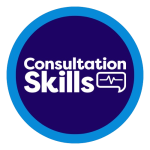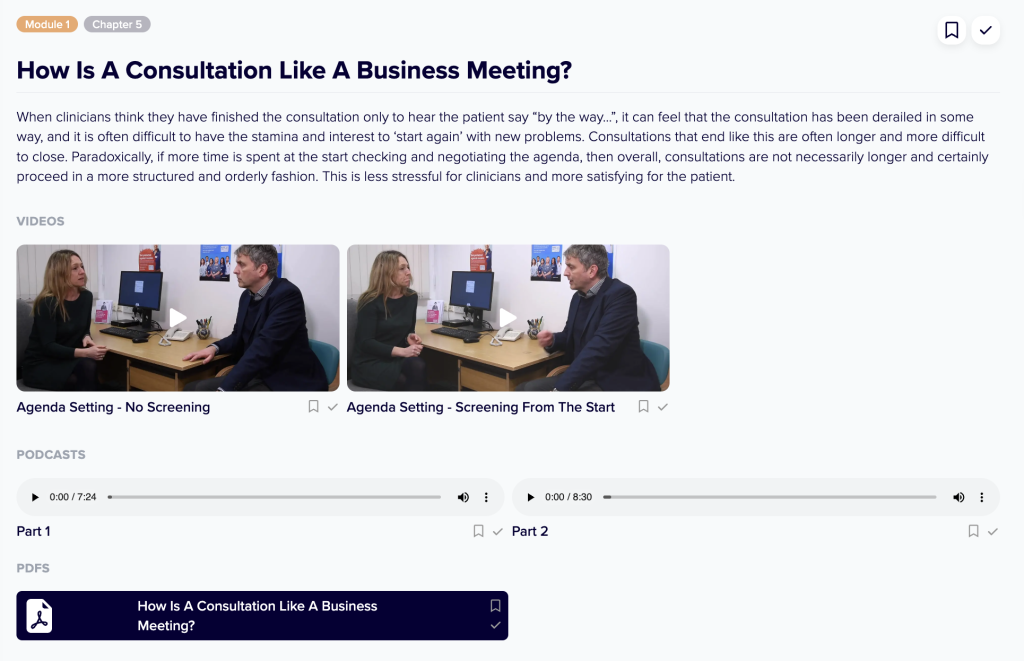Communication Skills at Your Fingertips
Subscribe to a powerful, flexible training resource developed by experienced NHS clinicians to improve how consultation skills are taught, learned, and practiced across healthcare. Grounded in peer-reviewed evidence and mapped to the Calgary-Cambridge framework, we support safer, more effective, and more compassionate care.
Whether you’re preparing for your exams, mentoring trainees, or refreshing your own approach, we help clinicians build the skills that matter most.
Why Consultation Skills Matter
This video introduces why these skills matter, and how learning them can transform everyday clinical practice.
Your Guide to Using TALC
This video is your guide to navigating our website and making full use of its resources.
Modules
Module 0 - IF YOU ARE NEW TO THIS
For individuals who are new to the NHS and primary care, learning consultation skills is critical to their success as healthcare professionals. In primary care, healthcare professionals work directly with patients, often on a one-on-one basis. As such, they must be skilled in communication, active listening, and empathy to provide effective care
Module 1 - SKILLS FOR BEGINNING CONSULTATIONS EFFECTIVELY
This module will help you to get ALL your consultations off to a good start. Investing in the beginning makes for smoother consultations overall. Find out how to go home with energy to spare.
Module 2 - SKILLS FOR BUILDING EFFECTIVE RELATIONSHIPS
When clinician and patient “get on the same page” and work collaboratively together, evidence shows better clinical outcomes, fewer errors and increased satisfaction for clinicians and patients alike. Develop your empathy skills and discover how 40 seconds of empathic interaction can have long lasting effects.
Module 3 - SKILLS FOR EFFECTIVE INFORMATION GATHERING
The ear is as mighty as the scalpel. Accurate diagnosis depends on great listening skills. Find out how your listening ear can be more effective in this module.
Module 4 - ESSENTIAL SKILLS FOR EFFECTIVE EXPLANATIONS AND PLANNING
Uncertainty, long term care, Persistent and Functional symptoms as well as mental health needs may lead to complex consultations. This module empowers clinicians to face these interesting situations with more confidence.
Module 5 - ADVANCED SKILLS FOR EFFECTIVE EXPLANATIONS AND PLANNING
Uncertainty, long term care, Persistent and Functional symptoms as well as mental health needs may lead to complex consultations. This module empowers clinicians to face these interesting situations with more confidence.
Module 6 - SKILLS FOR EFFECTIVE ENDINGS
Learn how to end consultations skilfully in this module. An effective ending is safer, results in fewer complaints and ensures clarity about the next steps for clinicians and patients.
Module 7 - SKILLS FOR MANAGING TIME EFFECTIVELY
Time is our most precious resource. This module sets out skills for using time effectively, meaning that the time that clinicians and patients spend together is more productive.
Module 8 - WELLBEING
The chapters in this module can give your mind a refreshing break, offer interesting thoughts to inspire your day and provide an effective boost to your learning.
Module 9 - EFFECTIVE METHODS FOR TEACHING CONSULTATION SKILLS
Mainly for educators, clinical supervisors and trainers, this module explores the tried and tested techniques that make for effective consultation skills education. From engaging your participants and developing effective feedback, through to creating really effective skills rehearsals and role plays, educators will find resources to support training in all environments.
Module 10 - USING CONSULTATION SKILLS IN COMPLEX CONVERSATIONS
Effective consultation skills for more complex situations, explores the skills needed for some of the more delicate and complex situations that clinicians need to discuss with their patients. This module is about skilled conversations, rather than specific skills. This will always require most of the skills from the TALC Modules 1 to 7, often applied with more awareness or more intensity or combined together in new ways to meet the circumstances.
Module 11 - SKILLS FOR TIMES WHEN THE CONVERSATION BECOMES AGGRESSIVE OR ABUSIVE
Health care professionals are facing rising levels of aggression, from anger and hostility to racism, misogyny, and personal abuse. While systems must step in, clinicians also need skills they can use in real time. Module 11 of TALC equips HCPs with practical, evidence-based strategies to stay calm, respond safely, and protect their wellbeing in the heat of the moment.
Module 12 - MANAGING UNCERTAINTY
Uncertainty is part of every clinician’s reality, from vague symptoms to unpredictable treatment outcomes. But how we respond to uncertainty can shape patient trust, clinical safety, and even our own wellbeing.
Across 25 conversations with frontline GPs, educators, and even philosophers, this module explores how to recognise different types of uncertainty and respond with skill whether you’re diagnosing, negotiating, teamworking or teaching others. Practical, honest, and often profound, it’s an essential toolkit for reflective, resilient clinicians.

